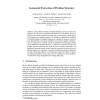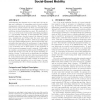327 search results - page 53 / 66 » How to Evaluate Social Intelligence Design |
ATAL
2010
Springer
13 years 9 months ago
2010
Springer
Establishing trust amongst agents is of central importance to the development of well-functioning multi-agent systems. For example, the anonymity of transactions on the Internet c...
GECCO
2004
Springer
14 years 2 months ago
2004
Springer
Most problems studied in artificial intelligence possess some form of structure, but a precise way to define such structure is so far lacking. We investigate how the notion of pr...
KDD
2007
ACM
14 years 9 months ago
2007
ACM
Commercial datasets are often large, relational, and dynamic. They contain many records of people, places, things, events and their interactions over time. Such datasets are rarel...
DAWAK
2008
Springer
13 years 10 months ago
2008
Springer
In order to be able to evaluate beforehand the impact of a strategical or tactical move, decision makers need reliable previsional systems. What-if analysis satisfies this need by ...
MOBIWAC
2009
ACM
14 years 3 months ago
2009
ACM
Understanding how humans move is a key factor for the design and evaluation of networking protocols and mobility management solutions in mobile networks. This is particularly true...


